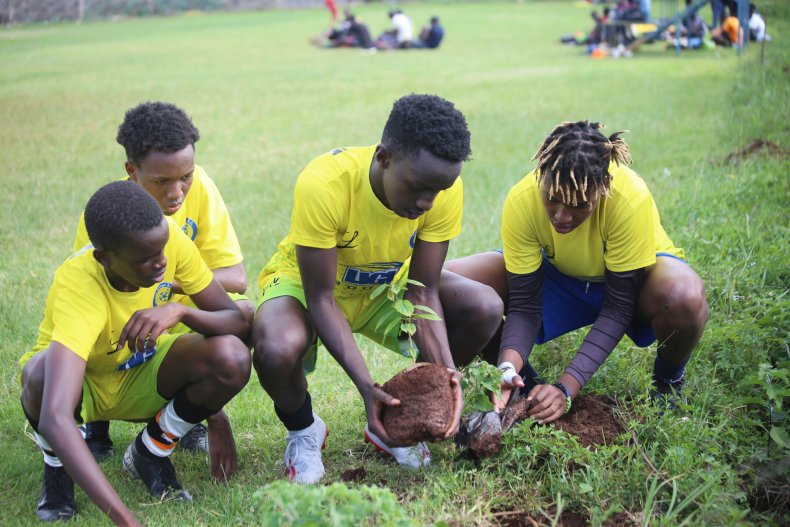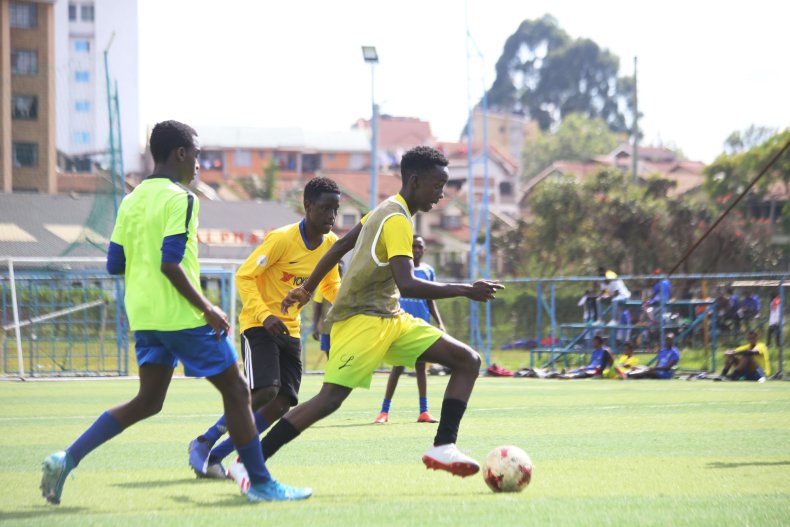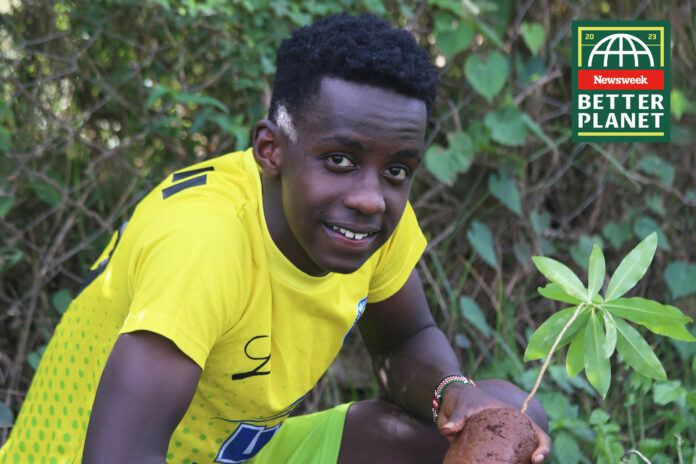Environmental advocate and recreational footballer Lesein Mutunkei has found a way to blend his love for the environment with his favorite pastime: soccer.
Mutunkei, currently in his late teens, plants at least 11 trees for every goal that he scores as part of his local team. His work has inspired others to join his program as well, in its effort to combat deforestation via success on the soccer pitch. A native Kenyan, Mutunkei told Newsweek that his passion for football dates back to early childhood.
“I’ve been playing football from the day I remember I was walking, but I started playing football in the football club at the age of 12,” he said in a Zoom interview earlier this year, from the Netherlands, where he’s been attending a pre-university program at United World College Maastricht. “That’s when I started planting to make an impact, to make a difference on the issue of deforestation and climate change.”
The league where he started at 12 was Nairobi’s Ligi Ndogo, which is Swahili for “little league.” He’s been playing in a local league in the Netherlands, but his environmental project to encourage others to plant trees, called Trees4Goals, remains based in Kenya where it is overseen by his mother and brother. There are a combined 15 schools and football clubs within Kenya participating in the program.
“I’m still able to get myself active in the game, score a few goals as well. I’m also planning to take up the project here with the local football club,” he explained. “You know, the Netherlands is really for green [activities] and for restoration of their planet, so the people here are very encouraging.”
(The Climate Change Performance Index, an annual German-based scoring system that aims to increase transparency on global climate protection measures, currently rates the Netherlands as No. 13 out of 59 countries, rising six places since last year’s ranking.)
Kanyiri Wahito
Mutunkei explained that he didn’t like how he was taught about climate change at school in Kenya. The curriculum, he said, lacked an urgency that would have pushed individuals to take steps to improve the environment in their own lives.
Mutunkei said the climate change information presented in the classroom was also obsolete, dating back to around 2000, when things were, as he put it, “a lot better.” This meant that the instruction he received “wasn’t current, wasn’t impactful, and it wasn’t showing what is going to happen.”
He said that he favors “user-friendly” information that could spur the younger generation to action.
“When we’re talking about user friendly, it’s just really trying to show the youth that whatever a little difference they make shall have an impact and put us in a better position,” he said. “I think that is also one of the foundations that made me start the [Trees4Goals] project—when I understood that my little thing counts, my little difference makes an impact.”

Kanyiri Wahito
Mutunkei said that Trees4Goals can’t do frequent plantings because of the dry season but that the project keeps track of the number of goals scored by all participants and comes together to plant that number of trees at the right time of year.
By July 2022, Trees4Goals had planted more than 5,500 indigenous trees in forests, at schools and near football clubs, CNN reported at the time. Mutunkei told the outlet that he and 22 soccer teammates once planted 700 trees in Nairobi’s Karura forest in under an hour.
He added that the program, which he would like to see expanded worldwide with more participating schools, leagues and players, and in the form of Trees4Goals tournaments, has moved beyond only soccer and now also includes a female tennis player who plants trees based on the number of sets that she wins.
“It’s important for us to focus on what we can do, whether it be planting trees [or] reducing our use of plastic or emissions, or recycling—that little, small change in our day-to-day lives is what makes the difference,” Mutunkei said. “Educating people about that, showing that they don’t have to only be football, they can be [playing] basketball, it can be in your business, whatever it is that you find as your passion or your talent or your interest, just including the responsibility to take care of the planet.”
While his reforestation efforts have taken off in recent years, Mutunkei said his connection to nature began much earlier in life.
“Because of the way I was brought up, just always going for nature walks with the family, camping in the outdoors, and my mom [can] tell you about how crazy I was, and I kept being outdoors, coming back with mud and stuff on my face,” he told Newsweek, describing his childhood in Kenya.

Kanyiri Wahito
“One time I can tell you I felt very emotionally connected to [nature] was when we had a tree in our estate we used to play around, football….We also used to climb the tree when the ball goes over the fence,” he told Newsweek. “One day, the tree got cut down…when I could have been 10 years old, so about eight years ago, they cut down the tree. I remember really crying that day. I really cried because of the destruction of nature. Because that tree was not—I don’t even know what [type of] tree it was, I don’t remember the type of species it was—but it was always part of us, as the neighborhood.”
To help advance his environmental goals, Mutunkei said readers can spread the word about both his organization and the impact of deforestation.
“Sharing the story, sharing my story, telling a friend that, you know, you are never too young to make a difference,” he said. “Just take action now—whenever you can.”


